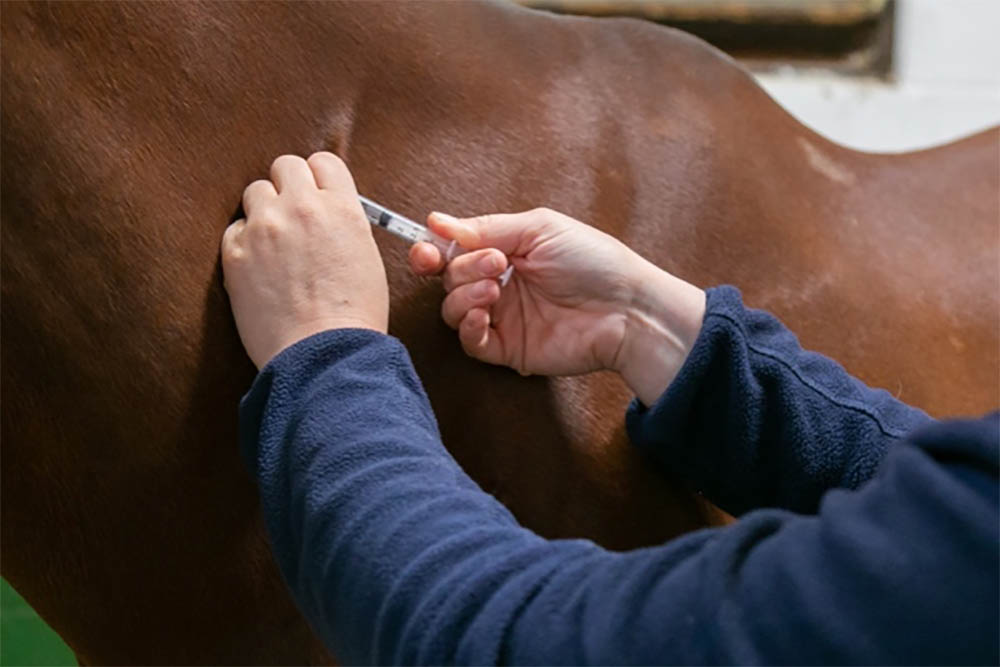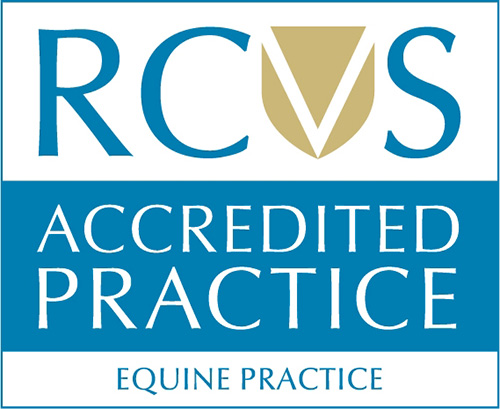Vaccinations

We undertake routine checks and vaccinations across Sussex, Surrey and Kent. We can do these efficiently on our zone visits. We run a reminder system but politely remind all clients that it is their responsibility to ensure that their horse's vaccinations are kept up to date.
Vaccination rules can be confusing but it is important to get it right. Many bodies such as BHA, BE, BS and FEI require particular influenza vaccination protocols. Below is a summary of their requirements and our vaccine manufacturer's recommendation. Please follow links to the appropriate authorities for more detailed information.
Influenza Vaccination (Equine Flu)
Vaccine manufacturer recommendations; 1st vaccination followed by second at an interval of 4-6 weeks. The third vaccination (first booster) is then administered 5-7 months later. Foals may be vaccinated from 6 months of age. Subsequent vaccinations then given on a yearly basis. Below are some of the protocols for different organisations but please look into this yourself if going to a competition as these can change.
BHA Rules (as of 1st January 2022)
*Please not this also includes Pony Racing
| Primary Course: | 1st Vaccine |
| 2nd vaccine to be given 21-60 days after the 1st vaccine | |
| First Booster: | 3rd vaccine to be given 120-180 days after the 2nd vaccine |
| Subsequent Boosters: | To be given not more than 6 months after the previous vaccine |
Horses need to have 6 clear days after a vaccine before the day of the race
FEI regulations and British Eventing (as of 1st January 2024)
| Primary Course: | 1st Vaccine |
| 2nd vaccine to be given 21-60 days after the 1st vaccine | |
| First Booster: | 3rd vaccine to be given within 6 months + 21 days of the 2nd vaccine |
| Subsequent Boosters: | To be given within 1 year of the previous booster If competing must be within 6 months + 21 days of the previous booster vaccination |
Horses must not have been vaccinated within 7 days of arriving at competition.
British Eventing Vaccination Rules
The Pony Club, British Riding Clubs and British Dressage (as of 1st January 2024)
| Primary Course: | 1st Vaccine |
| 2nd vaccine to be given 21-60 days after the 1st vaccine | |
| First Booster: | 3rd vaccine to be given 120-180 days after the 2nd vaccine |
| Subsequent Boosters: | To be given within 1 year of the previous booster Horses must not have been vaccinated within 7 days of arriving at a competition |
British Dressage Vaccination Rules
British Riding Clubs Vaccination Rules
Hurlingham Polo Association
| Primary Course: | 1st Vaccine |
| 2nd vaccine to be given 21-60 days after the 1st vaccine | |
| First Booster: | 3rd vaccine to be given within 6 months and 21 days of the 2nd vaccine |
| Subsequent Boosters: | To be given within 1 year of previous booster (or 6 months and 21 days to be eligible to play) |
A polo pony must receive a vaccine within 6 months and 21 days to be eligible to play, however, is not eligible to play within the 7 days following a vaccination.
Tetanus
Tetanus is usually fatal and is caused by the soil borne bacterium Clostridium tetani contaminating any wound however small. Because the incubation period is 7-21 days the wound is very often healed by the time symptoms start to show.
The risk of tetanus is significant and ever present and approximately 90% of unvaccinated horses who contract tetanus don't survive. Those that do survive require intensive veterinary care for at least 6 weeks.
Vaccination against the disease is very effective and is strongly recommended. Tetanus vaccination is commonly combined with influenza vaccination and if you follow the vaccination schedule for the combined vaccination your horse should be protected against tetanus.
When using separate vaccines, the tetanus vaccination schedule is as follows:
- Primary course two injections 4-6 weeks apart
- First booster within 12 months of the second primary injection
- Subsequent boosters only needed every 2 years
We advise that all horses are vaccinated against tetanus even if they do not travel or mix with other horses.
Equine Herpes Virus (EHV)
This is a common virus in the worldwide horse population. The most common strains to infect horses are EHV1 and EHV4. EHV4 is most commonly associated with respiratory disease whilst EHV1 is more commonly associated with neurological disease and abortion.
Abortion
Abortions generally occur in late gestation at about seven months and pregnant mares don’t always show signs of infection prior to abortion. Following infection, abortion occurs from two weeks to several months later. Foals can become infected whilst still in the mare’s uterus, which can lead to premature birth, birth of weak foals or foals that initially appear healthy but become progressively weak and lethargic within the first week of life. Ideally pregnant mares should be kept in small groups and kept separate from any other horses that come on to the premises.
Respiratory disease
Respiratory disease due to EHV is most commonly seen in weaned foals and yearlings in the autumn and winter. Following infection with the virus, they may develop a secondary bacterial infection.
Carriers
Horses that have recovered can become latently infected with the virus; that is, they don’t appear unwell but the virus is still within the body. When the horse becomes stressed the virus can then be reactivated and re-infection can occur.
Vaccination
Vaccinated horses can still become infected with the virus, shedding it in the environment and infecting other horses but the severity and length of disease will be reduced. Horses can be vaccinated from five months of age. The primary course involves two injections four to six weeks apart followed by regular vaccination every six months. Foals with insufficient colostrum intake can be vaccinated with a single dose at three months then again at five months, then four to six weeks after. It is advisable that all animals on a stud farm are vaccinated against EHV, whether they are pregnant or not, although pregnant mares can still abort following vaccination. It is not advisable to vaccinate in the face of an outbreak of EHV on a yard since it can exacerbate clinical disease.
Vaccination of pregnant mares
Pregnant mares that have had the primary course of vaccination should then also be vaccinated in months five, seven and nine of pregnancy. Boosters are required every six months.
Rotavirus
Rotavirus causes diarrhoea in young foals and vaccination of pregnant mares during late pregnancy causes increased antibodies to be produced in the mare’s colostrum (first milk). These antibodies provide increased protection to the foal providing it drinks the colostrum.
Rotavirus is a virus that damages the villi in the intestines making it difficult for the intestines to absorb nutrients from food, otherwise known as malabsorption. The damage to the intestinal lining makes the foal unable to digest lactose, a component of the mare’s milk. This causes diarrhoea that pulls water from the foal’s body. Left untreated the foal will become badly dehydrated, a situation that could lead to death. The virus is carried in the manure and if a horse comes in contact with the manure, the virus can easily be ingested.
Vaccination
It is recommended that broodmares (particularly those foaling away at stud) are vaccinated against Rotavirus. Injections are due at 8,9 and 10 months of pregnancy.

